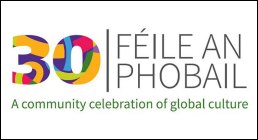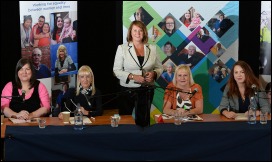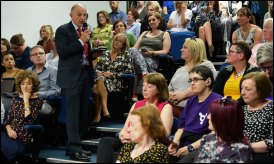
Read about the Commission's co-sponsored event, “What every woman wants – Equality!”, at Féile an Phobail.
This past few months, the Commission has engaged in a number of new initiatives aimed at listening to how a variety of communities understand equality. One such event took place on 8 August during this year’s Féile.

This was the first time the Commission has taken part and this year we co-sponsored the event, “What every woman wants – Equality!” with the Falls Women’s Centre, another, very successful, first for us. The original room booked for the event proved to be too small to the assembled crowd of probably close to 100 people, from a wide variety of backgrounds all of whom had different reasons for attending and we moved into the theatre in An Chultúrlann.
Some of those attending were “regulars” to Féile events, while it was clear during the time set aside for casual chatting that this was a new experience for others.
Our panel comprised four women, Carmel McKinney OBE, Amanda Ferguson, Alison Millar and Adrianne Feltz, all leaders whose combined experiences included public service, journalism, trade unions and social activism. It was ably chaired by Yvette Shapiro, a well know local broadcaster and journalist.
Panelists shared their own life experiences at the top of the programme, which then led into an extremely healthy and detailed discussion session - reluctantly drawn to a close by a call to lunch after a full-on 90 minutes.
There were many topics raised from the floor which I expected to hear, including the absence of women in public life, the need for empowerment of women, the need for more female role models, equal pay, sexual harassment and protections, flexible working arrangements, affordable child care, access to justice, job stereotyping including gender stereotyping in education and the need to create better opportunities for “women returners”.
Such a list confirmed and reinforced a range of the Commission’s current priorities.

There were several cross cutting themes which emerged which I had only heard on a few previous occasions. These included something referred to as “more sisterhood”, which included the need for women to support one another more in addressing discrimination and encouraging empowerment. A number of people raised the concern that they felt women were still “not taken seriously enough”, not only in job applications but also when raising difficult subjects including caring responsibilities, maternity concerns or the endemic issue of sexual harassment.
In reflecting on the latter issue, I admit that I hadn’t realised the extent to which harassment is something that is still encountered on a daily basis by most women and to my shame I have realised that all the female colleagues with whom I have raised the issue have at least one personal experience which they could share. That, to me at least, was one of the most striking personal realisations arising over that day. I say this, not as someone who is naïve to what goes on in the workplace or daily life, but rather because I really didn’t realise that it is not just something affecting a number of women, but is rather something all women appear to have experienced at some time.
There is no equivalent issue of such personal consequence affecting me as a man.
Violence towards women was another issue raised, with the staggering statistic quoted that every 3 days a women is murdered somewhere in the UK, the majority of whom have been killed by an intimate partner. In response to this one speaker remarked that New Zealand female employees are entitled to take a number of days as paid leave following a domestic violence incident. Food for thought.
But for me the most powerful voice during the event was that of one woman, , who in a few short sentences explained her life as one of many children, who had grown up believing she was “nothing” and had no self esteem. She spoke movingly and emotionally about how her involvement with the Falls Women’s Centre had effectively re-made her, given her support, helped create a new sense of her worth and allow her to be herself, recognising her gifts and abilities. This was a powerful testimony to the valuable work done in women’s centres, across Northern Ireland, and it was echoed by others through the discussion.
These centres are providing critical support services to women in local communities and it is of paramount importance that ways are found to ensure their financial support from government is not impacted by lack of a devolved Executive here.
I was both moved as well as challenged as I listened. The passion was evident, the desire to make women’s voices heard was clear and unanimous, the need for more targeted action against harassment and violence against women was strongly stated, time and time again.
So, what now? We were pleased with the open and full engagement of participants at the event, we have listened and I am now reflecting. The next step must be to see how the priorities which we take forward as a Commission over the next 3 years of our new strategic plan, can contribute to making this place better, safer and more accessible for women. The test for our success will be only determined by the evidence of actual positive change in the real lives of real women across this place I call home. The Equality Commission is determined to play its part to bring this change about.
Posted on 21 Aug 2018 by
Dr Michael Wardlow